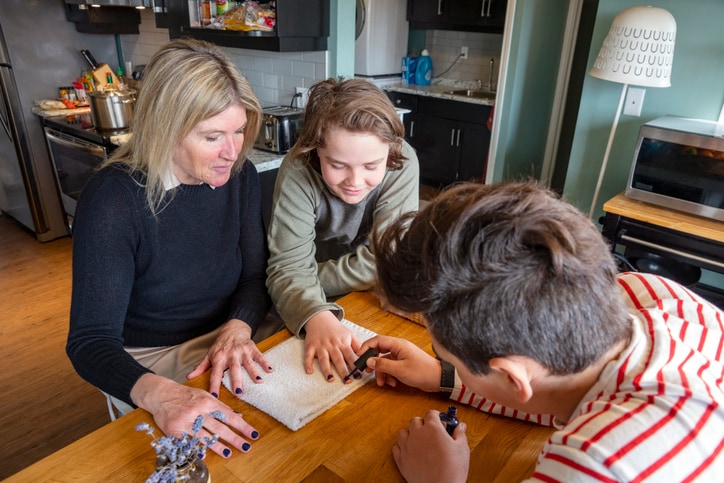The free range parenting movement is nothing new — but what exactly is it? Is it letting your kids get their own breakfast while you sleep late? Letting them walk to the park alone? Leaving them home without a babysitter? Not enforcing any rules or having set bedtimes?
What Does It Mean?
The term usually refers to raising kids today the way kids were raised in the past (and still are in other parts of the world), without the constant supervision common in today’s helicopter parenting trend. “Free range parenting is raising kids in a sort of old-fashioned way,” explains Lenore Skenazy, a leader of the free range movement and author of “Free-Range Kids.” “It is the belief that our kids are not in constant danger, so we don’t have to parent them as if they are.”
As with everything parenting-related, not everyone agrees, of course. Dr. Karen Ruskin, a family psychotherapist, says the term might be new, but it is “an old parenting style known as ‘permissive parenting.’ Children either get to do what they want because parents want to provide their children with a more ‘free’ existence, or children learn at a young age they have to deal with adult decisions on their own.” Some think it means raising kids without any rules or discipline.
Free range parenting, however, isn’t about letting kids run wild as they act on every whim. “This approach is for everyone,” says Skenazy. “This is how we were raised and how the rest of the world raises their children. It is not a new fad. Entire countries send their 7-year-olds to school on their own, because they believe in their kids and in their communities.”
One of the main misconceptions of the parenting style is that those who use it don’t believe in safety measures. But the method embraces traditional safety tools. Skenazy says, “We believe in helmets, cars seats, seat belts … we just don’t believe that kids should have a security detail every time they leave the house.” Proponents argue it lets kids be a part of the real world.
Benefits for Children
One of the biggest perks of free range parenting is that it gives little ones the opportunity to follow their passions and indulge their imagination. “It turns out unsupervised time is really crucial for kids, especially if they spend that time playing,” says Skenazy. “Because when kids are playing with each other, they play different from how they play with us.
They are forced to make their own decisions and you build that executive function,” which helps with problem solving and other cognitive skills. But Dr. Ruskin advises parents to find a happy medium with regard to constraints. “A child who experiences too much freedom ultimately may become reckless and lacking in emotional regulation,” she says.
But Skenazy says it is vital that kids get to play with other kids (unsupervised) because they get to make their own choices. “All these fantastic skills of maturity, empathy, compromise and problem-solving — all get practiced when kids are playing,” she says. Children can also grow more confident in themselves and their abilities. They learn how to tackle obstacles on their own, finding creative solutions to their problems and becoming more self-sufficient at an early age.
Of course, kids can develop some of that independence with proper supervision. “The free range philosophy is known to be the idea that children need to experience independence in order to grow independent,” Dr. Ruskin says. “But kids don’t need to be without adult supervision for extended periods of time in order to become young adults who are independent.”
Benefits for Parents
The style also has some advantages for parents. When you’re not present for every free hour of your child’s life, you have time to explore your own interests and accomplish other tasks. “For the parents, they get some free time. It turns out that kids don’t need us at every soccer practice,” Skenazy says. “They can walk themselves to school, and they can have play dates without us hovering and planning every detail, so that gives parents free time.”
Even if you’re not completely sold on the idea of free range parenting, you can find ways to incorporate the style into small parts of your child’s life. You could test out the style by giving your kids free time outside in a safe, enclosed space. Skenazy also recommends letting your child try to do a specific task independently, such as learning how to ride a bike. Yes, kids are going to wobble and fall as they pedal, and it could be scary to watch as a parent. But the payoff may be worth it. “When parents see their kids accomplishing something on their own, they are so happy that this crowds out the fear they had to begin with,” Skenazy explains.
Free range parenting isn’t the only trend that’s gaining steam. Read up on 5 New Parenting Trends from Care.com to see what’s hot in 2015.
Amy Aitman is a freelance writer, 8menwriting.com, as well as a mommyblogger, mommypatter.com. She loves giving kids freedom to try things out on their own, is loving the “I can do this all by myself” phase her 4 year old is still in and hopes to keep encouraging this independence down the road.






